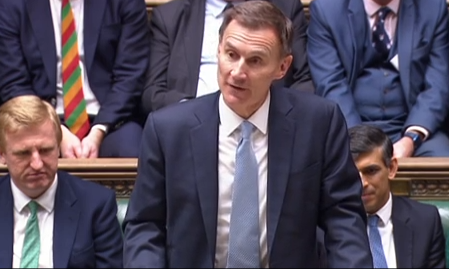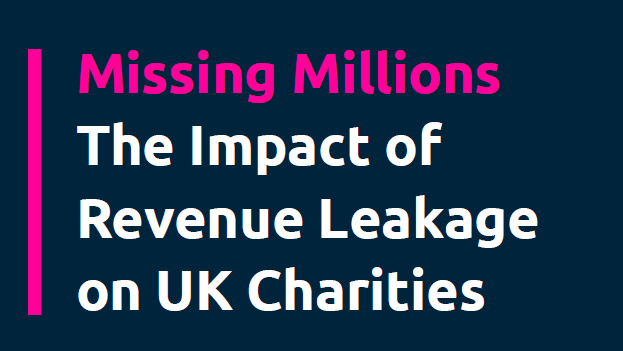Chancellor of the Exchequer Jeremy Hunt has announced an extra £45m in funding for medical charities and legal protections for Gift Aid in his Spring Budget.
But elsewhere in the charity sector his financial statement has been described as a ‘missed opportunity’.
In his budget speech he pledged to “support research by medical charities into diseases such as dementia, cancer and epilepsy with an additional £45m, including £3m for Cancer Research UK”.
This is being provided through the Medical Research Charities Early Career Researchers Support Fund.
He has also pledged to amend Gift Aid legislation due to implications of the Digital Markets, Competition and Consumers Bill.
Legal experts had feared the Bill could harm charities’ ability to claim Gift Aid on membership subscriptions.
Treasury documents detail that the change is being put in place so “that charities can continue to claim Gift Aid while complying with these new protections” adding “the government’s intention is that these amendments to the Gift Aid regime will be in place by the time the relevant provisions of the Bill come into force”.
Despite these moves, charities have raised concerns about the Spring Budget’s wider measures and lack of action to improve support for their service users. This includes a lack of improved support for councils that provide funding to the sector.
Last month research found council funding for charities had fallen by more than £13bn over the last decade.
Tony Armstrong, chief executive of community group network Locality says the Spring Budget “has ignored the elephant” of “mounting pressure on councils to cut services”.
“From Birmingham to Bristol, Nottingham to Thurrock, council cuts mean that charities and community organisations are struggling to keep vital local spaces and services alive,” he said,
‘Missed opportunity’
Homelessness charity Centrepoint’s head of policy and research said Hunt’s Spring Budget “was a chance for the government to improve their approach to homelessness funding and the strategy underpinning it – but it was an opportunity missed”.
She added: “A good place for the Chancellor to start, particularly given the perilous state of local authority finances and their direct impact on homelessness services, would have been a settlement that lifted councils out of the financial black hole that temporary accommodation is becoming and a plan for easing the eviction crisis currently being endured by private renters.
“Hundreds of thousands of people, many of them young people who should be looking ahead to the rest of their lives, find themselves trapped in a cycle of homelessness and poverty, with little hope of support from a government that today seems to have forgotten them.”
NCVO chief executive Sarah Vibert has also labelled the Spring Budget as a "missed opportunity".
“Following a decade of cuts, a pandemic, and the ongoing cost of living crisis, the voluntary sector is doing its best to continue to meet high and growing demand with ever-fewer resources," she said.
"But our best may not be enough for the people who rely on our support. We’ve been clear that we need bold action from government."
Click the link below to read today’s Spring Budget in full
— HM Treasury (@hmtreasury) March 6, 2024
👇https://t.co/9BPXXvBqQh pic.twitter.com/pcMJp9JXOH
Meanwhile, anti-poverty charity St Vincent de Paul Society (SVP) has warned that the Spring Budget “does not do enough to address some of the important issues affecting people in the UK”.
“Over the past two years we have seen a steady rise in requests for help,” said SVP chief executive Elizabeth Palmer.
“Our national office alone has seen a 49% increase in requests for help. This is in addition to the over 19,000 people supported by our centres, community hubs and volunteer member groups.
“Policies announced today will provide little relief to people who are struggling to meet their essential needs including food, heating and housing. We will continue to respond to calls for help, but we urge the government to act urgently to provide support for millions of households who are simply not coping.”
Islamic Relief’s head of communications and creative content said the Spring Budget “falls short of meaningful measures to support families who have already been hit hardest by the cost-of-living crisis and are being left without the vital support needed”.
“If the situation continues, a harrowing number of additional people will be pushed deeper into poverty,” she added.
Other measures included in Hunt’s Spring Budget include a cut in National Insurance and maintaining the Household Support Fund for a further six months.
This Fund was set up to combat the cost-of-living crisis but will be extended following lobbying by MPs and charities including the Joseph Rowntree Foundation and the Trussell Trust, said Hunt.
Increasing demand
But Pro Bono Economics chief executive Matt Whittaker said that despite the National Insurance cut and Household Support Fund announcement, “too many face challenges that continue to deepen”.
“A significant minority of the UK population cannot afford to heat their homes or to eat healthy food,” he warned.
“The number of people in temporary accommodation has hit record levels, while physical and mental health continues to deteriorate.”
Whittaker said: “There is little else in today’s announcement designed to support those in the greatest need. That is likely to mean demand on the nation’s charities continuing to climb.
“The charity sector is just beginning to emerge from the pandemic and cost of living crisis, and capacity remains tight – with a third of charities expecting to be unable to meet demand for their services this quarter.
“Indications are that charity income will gradually improve over the next year, but that recovery is fragile.”
‘Few measures to help the charity sector’
Charity Tax Group has said that while Hunt has offered “various give-aways”, it is concerned “there were very few measures to help the charity sector”.
Despite these concerns it welcomes an increase in the VAT registration threshold, which will “help smaller charities to avoid being drawn into the VAT net”. It also welcomes relief for museums and galleries.
“But this all comes against a backdrop of a focus on the need to improve public services and yet the Chancellor missed a great opportunity to make a cost-effective investment in the provision of key services at a community level by helping charities with the huge amount of irrecoverable VAT that they pay each year,” the group added.













Recent Stories